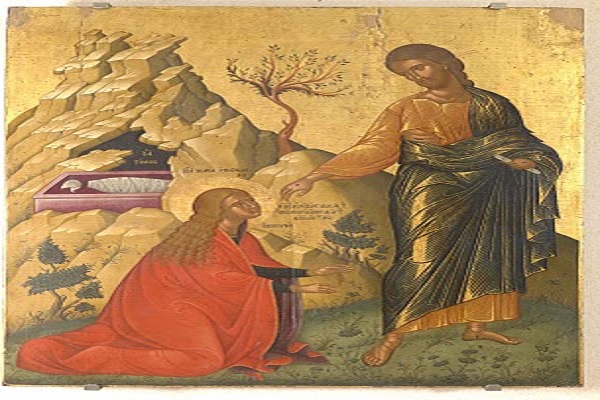Do not touch Me (Jn. 20, 17)
2 May 2017
Given the time and place where Christ spoke these words to her, Saint Mary Magdalene might be viewed as a symbol of those ‘Church’ people who, on a spiritual level, have enjoyed many heart-warming and fruitful encounters with the Lord in His Church, but who, in the course of their relations with Him, at some time lose both contact (Christ having been crucified and buried) and the religious interaction. They then see that they’ve gained nothing. As a result, they stumble between hope and desolation, though at the same time retaining, after a fashion, all the feelings of worship and devotion to Him Who is no longer to be seen. They continue to go to church, just as Mary Magdalene went and waited at the empty tomb. They greatly desire a rekindled and profitable relationship with Christ, hearing Him preach the divine word, mingling with the saints and the faithful, just as Mary met with the angels next to the empty tomb.
They’re helped in this effort to experience their grief over their lost relationship and to express it (‘Woman, why are you crying? Who are you looking for?’ ‘They’ve taken my Lord from the tomb and I don’t know where they’ve put Him’). It’s at precisely this time, when we’re grieving through lack of comprehension and sobbing over the loss of the One Whom we desire, that Jesus judges that He can inaugurate a different relationship with us, though without the possibility of any renewal of contact as it had been in the past (‘Do not touch me’). Instead He challenges us to proclaim the truth of the Resurrection to the others, to His fearful and troubled disciples, while we await our elevation to a new spiritual – at least more spiritual- level in the Upper Room at Pentecost, with the descent of the Holy Spirit, the Comforter, when we’ll understand the words: ‘God is spirit, and those who worship him must worship in spirit and truth’. Then we’ll be able to understand and wish to experience the words: ‘…let him deny himself and take up his cross’. We’ll be able to work towards uniting their own person with the Person of Christ. We’ll want to be like Christ rather than to enjoy some selfish religious trade-off.
Source: agiazoni.gr






